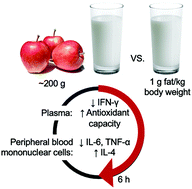Apple consumption reduces markers of postprandial inflammation following a high fat meal in overweight and obese adults: A randomized, crossover trial†
Abstract
High fat meal-induced postprandial inflammation is exacerbated in overweight and obesity and may contribute to cardiovascular disease (CVD) risk. This study aimed to determine the effects of apples, rich in anti-inflammatory polyphenols, on biomarkers of postprandial inflammation in individuals with overweight and obesity. A randomized, crossover trial was conducted with n = 26 participants (17 female/9 male; mean age 45.5 ± 3.12 years; mean BMI 34.1 ± 1.18 kg m−2) to assess the effects of 3 whole Gala apples (∼200 g) on the 2, 4 and 6 h postprandial response to a high fat meal providing 1 g fat per kg body weight. Changes in plasma biomarkers of inflammation (as the primary outcome) and endotoxin exposure, non-esterified fatty acids (NEFA) and total antioxidant capacity (TAC) were measured. Fasting (0 h) and 4 h peripheral blood mononuclear cells (PBMC) were also isolated from whole blood and stimulated with or without a physiological dose (10 ng mL−1) of lipopolysaccharide (LPS) to measure secreted cytokines. Apples modulated postprandial plasma IFN-γ and reduced its peak concentration (−12.8%), and increased both 4 h (14.4%) and peak (10.5%) TAC (P < 0.05). In unstimulated and LPS-stimulated PBMC, apples reduced secreted IL-6 (−49.3% and −17.1%) and TNF-α (−43.3% and −14.7%) and increased IL-4 (93.1% and 15.8%) in both the unstimulated and LPS-stimulated conditions, as well as decreased GM-CSF (−26.0%) and IL-17 (−47.9%) in unstimulated PBMC and G-CSF (−19.8%) in LPS-stimulated PBMC (P < 0.05). These data suggest acute whole Gala apple consumption may be an effective dietary strategy to mitigate high fat meal-induced postprandial inflammation that exacerbates CVD risk in overweight and obesity. This study was registered at clinicaltrials.gov, NCT03523403, The Apple Study: Investigating the Effects of Whole Apple Consumption on Risk Factors for Chronic Metabolic Diseases in Overweight and Obese Adults.



 Please wait while we load your content...
Please wait while we load your content...